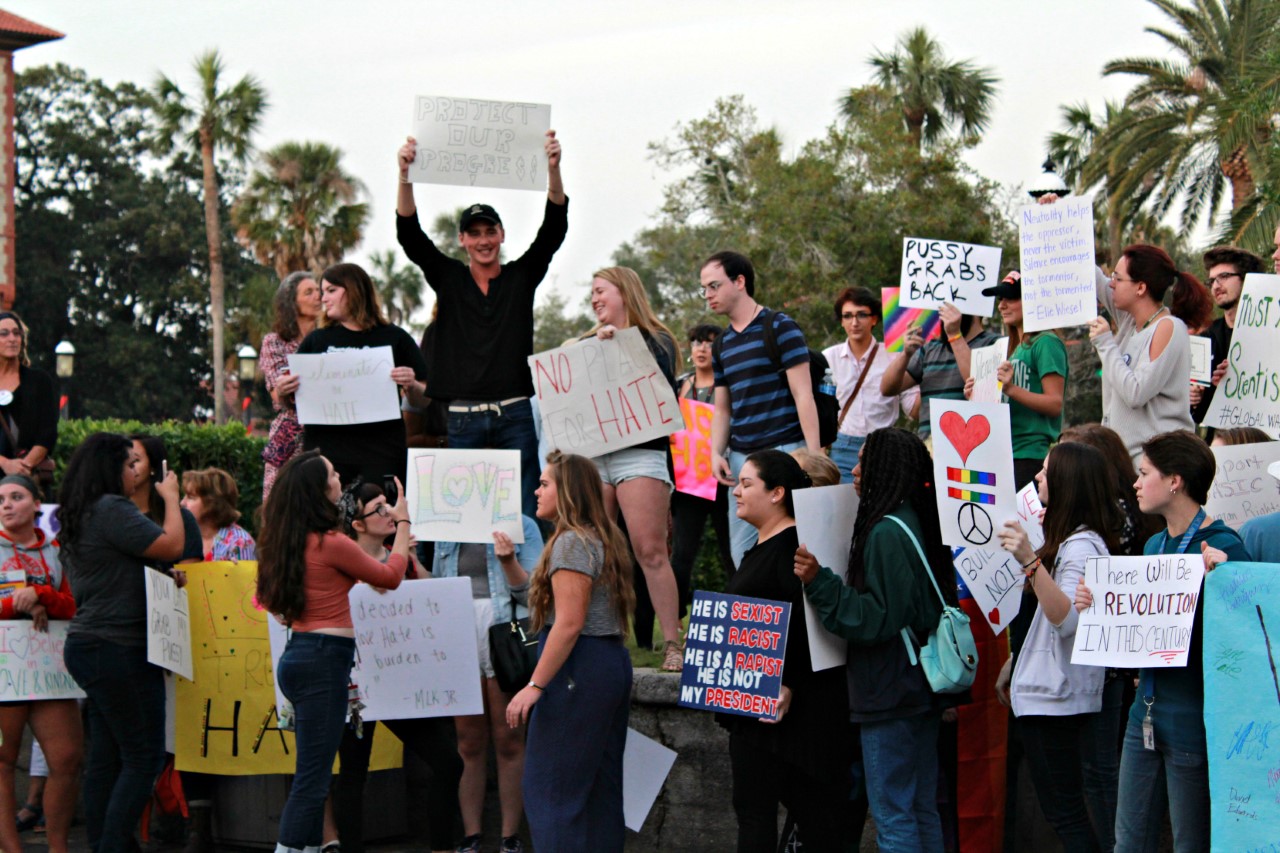By Courtney Knudson gargoyle@flagler.edu
ST. AUGUSTINE – Cities across America have seen a backlash since Donald Trump won the presidency. On Monday, leaders of demonstrations in Portland, Oregon, were arrested after the protest turned violent.
In St. Augustine, residents held a peaceful protest of their own on Nov. 11, drawing in nearly 100 people.
According to the protest’s Facebook event, called “We Will Not Be Silenced – Anti-Hate Protest,” the demonstration’s purpose was not targeting Donald Trump or his supporters.
“I think what’s misconstrued about this event is the purpose. This is not an anti-Trump protest. It’s an anti-hate protest,” said Courtney Boyle, a junior at Flagler College. “I don’t think people have a problem with Trump as much as they have a problem with the hateful rhetoric he is spreading.”
The Facebook event stated that the protest was created to take a stance on “Trump’s stated position of misogyny, racism, anti-LGBTQ rights and violence, and anti-environmental priorities.”
Protesters used words like “heartbroken”, “disgusted” and “horrified” to describe their reaction when they heard the election results. “I feel like I’m living in the 1950s,” said Flagler College junior Maxwell Stone.
Stone said that although he’s a straight white male, he was fearful for his friends who are gay, black, Muslim, bisexual, or illegally living in the United States. “It’s a world of hatred now. You’re legitimizing hatred,” he said. “And even if you argue that only 10 to 15 percent of the supporters are racist, congratulations, you just gave them a voice.”
Boyle agreed with Stone. She said that even though she is not gay or a minority, she fears that the hatred would become an issue for her friends who had fought so hard for the rights that they have. “To think that they could be taken away in the blink of an eye, that’s terrifying,” she said.
Nearly all of the protesters admitted that they knew that little could be done about the election results, but said protesting was the best way to make their voice heard. College sophomore Hasani Malone said that she realized standing on the street wouldn’t get Trump impeached, but she felt it was important to speak out. “I wanted take back the voice that I felt like I lost during the election and I got to do that,” she said. “I can’t take off my skin color after a long day of being oppressed. I shouldn’t have to fear for my life more than I already do. Nobody should.”
Dakota Niswonger, a senior at Flagler College, echoed Malone’s sentiments. “The real goal of a protest is to show that you will not be silenced, that you will never stop fighting. That’s all it is,” he said.
Niswonger said he wasn’t surprised that Trump won, but that he was not planning on remaining silent. “When they try to invalidate a protest by saying ‘It won’t accomplish anything’, well it’s not supposed to accomplish anything. It’s supposed to show that we will not simply roll over and take it, we will not be silent, and we are not afraid to speak up.”
The protest, while peaceful, was not without opposition. Dillon Gold, a senior a Flagler College, said the protesters did not staying true to their message of preventing hate. “They’re wearing ‘F*ck Trump’ shirts. The hypocrisy is unbelievable,” he said. “I don’t understand where the hate they’re talking about is coming from.”
Another man held a sign with Hillary Clinton’s face that said, “She lost get over it.”
Aurdra Gass, an Army veteran, stood on the opposite side of the street along with other Trump supporters.
“I spent 22 years of my life serving this country, so I’m happy these people are out here,” she said. “It shows freedom of speech, but we won fair and square.”
 Drivers in cars passing by yelled obscenities out of their windows as they drove by. Several tourists on the street whispered, “That’s what they’re teaching these kids?” as they shuffled past. Online, opinion columns from media outlets like Fox News and the Boston Herald have referred to these national protests as “temper tantrums”. St. Augustine protesters resent that characterization.
Drivers in cars passing by yelled obscenities out of their windows as they drove by. Several tourists on the street whispered, “That’s what they’re teaching these kids?” as they shuffled past. Online, opinion columns from media outlets like Fox News and the Boston Herald have referred to these national protests as “temper tantrums”. St. Augustine protesters resent that characterization.
“Protesting is an inherently American thing to do, beginning with the Boston Tea Party, of all things, an incredibly violent protest where a large amount of property was destroyed,” said Niswonger. “If protesting is somehow the same thing as throwing a tantrum, then those who are saying such things would do well to remember that their entire country was founded by men who were ‘throwing a tantrum.’”




Be the first to comment on "Protests – and praise – over Donald Trump’s election"